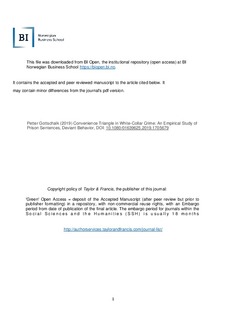Convenience triangle in white-collar crime: An empirical study of prison sentences
Journal article, Peer reviewed
Accepted version
Permanent lenke
http://hdl.handle.net/11250/2634144Utgivelsesdato
2019Metadata
Vis full innførselSamlinger
- Publikasjoner fra CRIStin - BI [1015]
- Scientific articles [2181]
Sammendrag
The theory of convenience suggests that the likelihood of white-collar offenses is dependent on financial motives, organizational opportunities, and personal willingness to commit and conceal financial crime in an occupational setting. The convenience triangle suggests that motives, opportunities, and willingness can reinforce each other to commit and conceal the crime. While developing research hypotheses both for the extent of criminogenity and for interactions in the triangle, this research has failed in identifying empirical sources to test suggested hypotheses. Instead, we derive and interpret data from 408 convicted white-collar offenders into intentions to commit financial crime. Given this transformation of data from court documents and media reports, we find support for all three hypotheses regarding motive, opportunity, and willingness as predictors of white-collar crime intentions.
